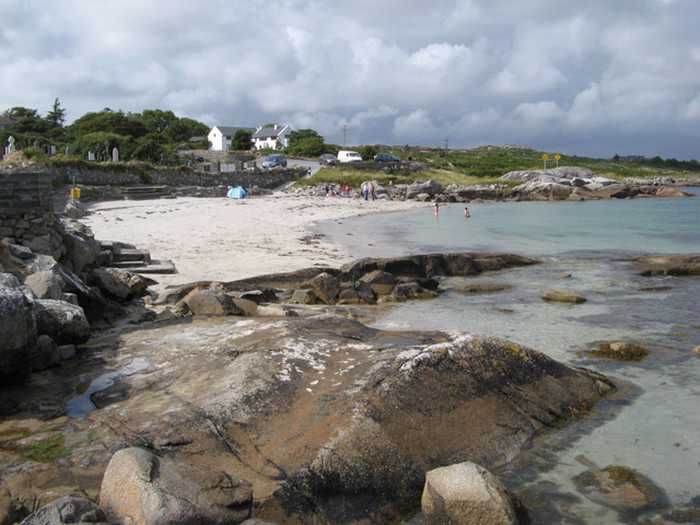Trá na Reilige, An Cheathrú Rua
- Water temp(satellite):
- 10.5°C
- 2025-04-22
Trá na Reilige, An Cheathrú Rua is a beach in Galway. Parking is available nearby. Dogs must be kept on a leash at all times.
Trá na Reilige is a small sandy beach, about 50m long, situated 2km from An Cheathrú Rua village. The road leading to the beach is narrow and parking is limited, but the rugged coastline and stunning views of Ros a Mhil peninsula make it a beautiful spot to visit.
Please help the next visitor by writing a few lines about the beach, are there toilets? Is it shallow? Is there a jetty or maybe a kiosk?
Beaches close to Trá na Reilige, An Cheathrú Rua
Trá an Dóilín is a unique Irish beach made up of fragments of "maerl", a calcareous seaweed. It is a rare site to find this type of material on a beach. The beach is exposed and can experience powerful waves. Along with the beach, there are various habitats including rock pools, reefs, rocky outcrops, and a freshwater lagoon that are home to a diverse range of plant, animal, and bird species. As a result, it is a popular location for snorkeling and diving.
Trá Mór is a sheltered sandy beach facing east, situated on Garumna island in south Conamara between Carraveg and Greatman's bays. The rocky shoreline has several small cove-like beaches along its length. The beach is around 7 km south of Beál an Daingin and accessible via the L52323-0 local road. It falls within the Kilkieran Bay and islands protected area.
Trá Chaladh Fínis is a charming rural beach that offers stunning views of Finish Island. It features diverse vegetation and presents an array of bird species. Additionally, you may spot some aquatic animals, such as seals and otters, near the shore. Popular activities at the 400-meter-long beach include swimming, bathing, and surfing.
Trá Mór is a picturesque sandy beach situated amidst rocky coasts and farmland along the Connemara coastline. This lively spot is home to diverse vegetation, fauna, and aquatic life such as seals and otters. The beach is ideal for water sports, swimming, and bathing.
Cill Mhuirbhigh beach is a sandy, sheltered shore with rocky boundaries to the west and east. There's also a small area of marram dune with a diverse vegetation range. The Machair habitat within Cill Mhuirbhigh hosts various rare plant species and supports animal and bird communities containing endangered species. The plants are protected by law, and their rarity has earned them a place in the Irish Red Data Book. The prehistoric fort Dún Aonghusa, a UNESCO World Heritage Site, is located on the island, which has immense cultural and environmental significance.
Céibh an Spidéil is an east-facing sandy cove that features a fishing pier and rocky shore. It offers diverse plant and animal life, including otters and seals. Swimming and fishing are popular activities.
Trá na mBan is a diverse bathing location with a blend of rocky and sandy terrain that becomes submerged at high tide. It's home to a range of creatures such as birds, aquatic animals, shellfish, and vegetation, including seals and otters. One can indulge in water activities like swimming and watersports here.
Inis Oírr, located 17km from Galway and 9km from Clare, boasts Trá Inis Oírr, a stunning beach on its northern coast. Through traditional farming methods, the island has managed to preserve its top ecological status. Additionally, Inis Oírr hosts international avian species identified under Annex 1 of the Birds Directive. The island serves as a breeding ground for Choughs, while other safeguarded birds such as Little Tern, Arctic Tern, and Sandwich Tern can also be found on this magnificent island.
This serene sandy beach is situated on the north-eastern shore of Inis Oirr in outer Galway Bay. It's a favourite spot among locals and can be reached via a tar road. Fishermen frequent the beach and it's conveniently located near the airstrip and lighthouse. It's just a 15-minute walk from the pier, offering breathtaking views of the Clare coastline and the picturesque countryside.
Trá na bhForbacha is a sandy beach with strong waves and currents, supporting diverse shellfish, birds, animals, and plants. Seals and otters are commonly spotted. It is a proposed Natural Heritage Area, where swimming, bathing, and water sports are popular activities.

